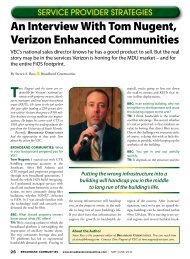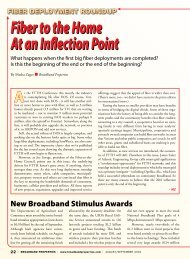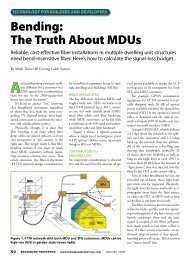TecHnoLoGy - Broadband Properties
TecHnoLoGy - Broadband Properties
TecHnoLoGy - Broadband Properties
Create successful ePaper yourself
Turn your PDF publications into a flip-book with our unique Google optimized e-Paper software.
THE LAWwiring over which they are going to provideservices. If you’re going to be usingthe incumbent’s wiring, are you buyingit from him? In my contract they ownit and may have removal rights for 90days. I don’t want my residents worryingif they’re going to have services for thenext 90 days.Davis: Hopefully your contract alreadyaddresses what happens with thatwire. From an owner’s perspective thisis becoming more and more of an issue.I don’t want to be between DirecPathand Time Warner; I want somebody togive me an indemnity and I want theproviders to sort it out. If you get intoa dogfight over the wiring, I’m out of it.There will no service discontinuation.You guys go to court and fight it out.All I care about is getting proper servicefrom the service providers.Question from floor: If I’m a providerand someone else is going into therouter closets, to me that negates mywhole service operation. Believe me,you’re opening a can of worms when youtake nonexclusivity. You’re going to beleft in a very hard place if you have twoproviders and someone cuts the cable ofsomeone else.Trickey: In practical terms, no onewants the customer to be out of service.Yet the new provider comes in and cutsa wire and somebody has to come andrepair that – but I think the incumbentis going to look to the new provider andsay, “I had to roll a truck. I’ve had tocome out and repair this cable. It’s yourfault; you need to pay up.”Question from floor: One of thethings you’re now addressing is that it’shard enough to manage one provider. Ifyou have seven providers you’re going tohave a management person coming in tomake sure those providers don’t come inand do damage to any wiring closets.Farrell: This goes back 20 years; it’snothing new. When the FCC issued insidewiring rules for voice service in themid 1990s they really didn’t see that thatwiring could be used for video service.… In the commercial market you havepressure from tenants saying, “I wantthis company in the building” to provideservice and that’s really what drovethat market to open up. But in residentialsituations I don’t know how it playsout. Clearly owners are feeling pressureto bring the competition in, but at a certainlevel once you’ve got triple play inthe building you’ve met the basic needand you’re not under the same pressure.The individual resident in an apartmentbuilding has a lot less market power thanthe law firms in an office building.Davis: We’ve got a lot of problemswith clients that are in this world already.In commercial space providers arearguing over building access statutes.But in my experience with multifamilybuildings, providers there are far less litigiousand are, for lack of a better word,considerate of other providers’ facilities.And if you run into a situation – andwe’ve run into it a few times – when theMSO calls me and [says] someone cutinto my wiring or someone cut into mylockbox or someone’s using my wiring,it’s OK, we facilitate a solution so wedon’t run into this over and over again.The providers have done a very goodjob of working with each other in largepart because they are emphasizing havinggood relationships with the propertyowner’s marketing directors and seniorfolks, so when you get a gripe it’s a phonecall and not the litigation, threats, lettersand all that good stuff. In my role,if I hit that point then my contract hasalready failed to do its job.Consumer MisperceptionsGeldon: One of the unfortunate thingsfrom the FCC rule last year was someof the press that accompanied it andthe misperceptions that evolved. Headlinesscreamed, “FCC opens up apartmentbuildings.” Well, that’s not reallythe case. What the FCC did was veryspecific. It banned one type of clause inservice contracts. It did not mean thatsuddenly everyone has a right to provideservice to a property. The propertyowner should still control access to theproperty and should still be able to arrangeand negotiate the terms and conditionsof that access.Unfortunately residents saw the headlinesand all of a sudden thought that onNovember 1 last year they should be ableto call and be able to get any service underthe sun that they wanted because theFCC did this magical thing. That’s notthe case. If DIRECTV does not have acontract on that property the residentcan’t get DIRECTV through the building’snetwork. If there is no agreementwith Verizon to supply FiOS on thatproperty the resident can’t just call andget FiOS. There has to be this process.Ames: If the provider puts the ONTin the unit you basically have given upcontrol over all three services – voice,data and video. That’s at least the positionthat Verizon has taken – on a unitby-unitbasis you’ve lost control. Thus,a provider absolutely has motivation toput the ONT in the apartment if hecan. One of the difficult things in writingcontracts is, you don’t know if thereare a lot of open questions that could bedecided in a regulatory ruling as thesethings bubble up.Look at the conflict between the insidewiring rules on the cable side versus thetelephone side. If you’re a cable companydealing with an ILEC, which set of rulesapplies? That heightens the uncertaintybut it also makes it an imperative that youdo what you can to set up a contractualmechanism. And if the company is insistingthat it is “paying for it and owns it,”are you going to let them in, and what arethe terms of the agreement?Davis: The situation you’re describingwas why a number of us were up in armsthree or four years ago, because we didn’tknow how the FCC was going to implementit and everyone thought they weregoing to demand an exclusive agreement.That’s not how the real-world implementationhas gone down. At this point ifthere is negotiated a licensing agreementof limited term that relates to facilitieswithin your building, and after a certainterm they can go away at your request sothe public isn’t held captive beyond five,seven, nine years or whatever it is, it isOK. But as an owner you have them dothe FTTH including additional Cat 5Eso if you choose one day to dispose of theFiOS system you have the ability to get aservice box if that’s your election.Hubacher: Both Ian Davis and Iadvise our clients that if you do let Verizon,or AT&T for that matter, installfacilities all the way into the unit, in the90 | BROADBAND PROPERTIES | www.broadbandproperties.com | July 2008
















